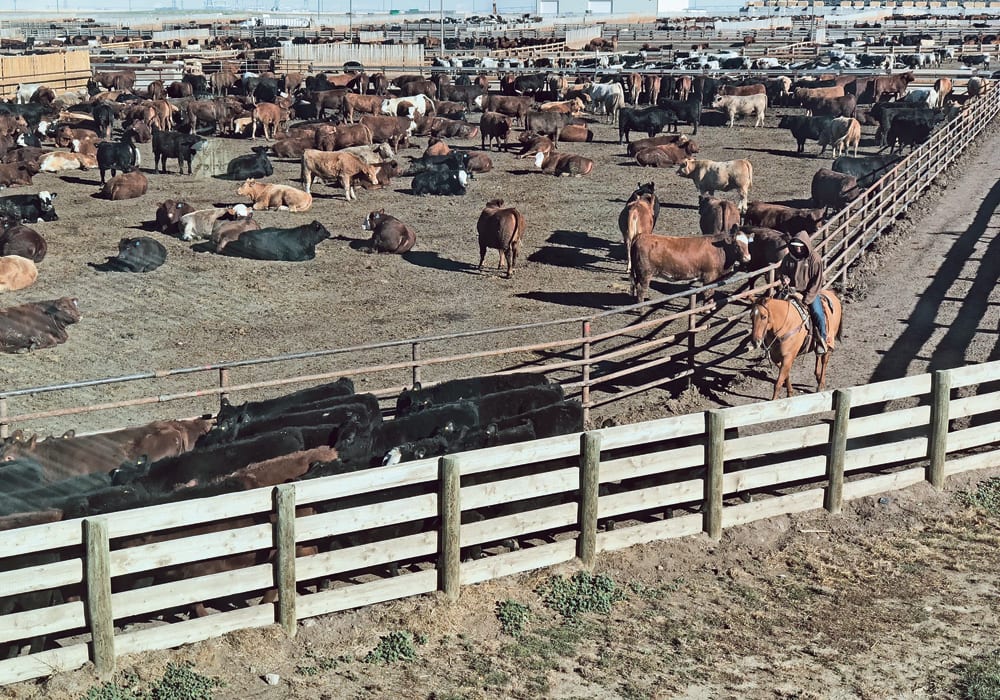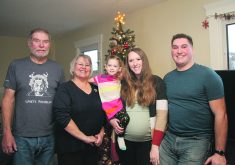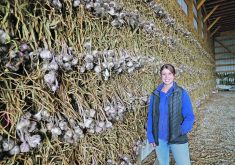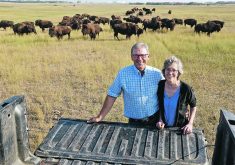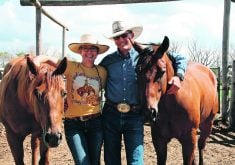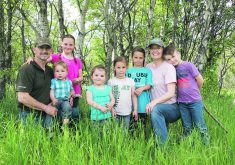Windows in the second-floor office at KCL Cattle Company provide a good view of the 9,000-head feedlot north of Lethbridge.
It’s a good place to watch the cattle and the workings of an operation that is a passion for the Wall family, which includes Les and Lisa, their daughter, Karleen Clark, and her husband, Jared Clark, and their daughter Celia Granberg.
Les was recently elected as a director-at-large for the Canadian Roundtable for Sustainable Beef, a group that reflects many of the same quality and production goals as he and his family.
“I think it’s the way of the future,” said Les. “I think packing plants in the future will be demanding that the people who they procure meat from are going to be verified operations.”
Participation in the roundtable is the most recent example of KCL’s innovation. It was among the first to participate in organized beef quality programs, which have since evolved into Verified Beef Plus. It was the first to install an on-site micro-mill to produce supplements for the cattle and KCL was an early adopter of rolled compressed concrete in feedlot pens to ease cleaning and improve conditions for livestock.

Expansion has been rapid, considering Les’s parents both came to Canada with almost nothing.
Les’s father, George, was born in Ukraine and his family emigrated to Canada when George was six.
“Their first home was in a granary bin. They didn’t have a very easy time, obviously,” said Les.
His mother was born in Siberia and the family later went to Afghanistan, Iraq and Germany before fleeing to Canada in the 1940s. Both families ended up in the Coaldale area. After they met and married, Les’s parents had four sons and bought land in the area.
Les, the youngest, met and married Lisa in 1988 and after working on the family farm, his father helped them buy the home feedlot north of Lethbridge in 1999.
Read Also

Nutritious pork packed with vitamins, essential minerals
Recipes for pork
Ten years later, they bought a 7,000-head feedlot near Coaldale that they are currently expanding to house 15,000 head.
“We’ve been expanding ever since,” said Les. “Right now we’re in the midst of a big expansion at our east lot. Jared has been very busy, he’s done most of the planning for that.”
As well, Les and other investors bought a feedlot south of Regina a few years ago. That operation, Ceylon Gap Feeders, has a 12,000-head capacity that is in the process of expanding to 20,000.
Until recently, Lisa did all the books for the growing operation. Karleen, after getting a business management degree at the University of Lethbridge, works full-time at KCL, as does Jared, a city kid turned farmer.
Celia, also a full-timer, has Les and Lisa’s first two granddaughters and Karleen is expecting the third grandchild in February.
Lisa said she is pleased that their daughters have chosen to stay in the feedlot business.
“I think we’re all getting along good now,” she said. “We all have the same vision here, which is good. I think that helps. We all want to expand and keep it going.
“I’d like to see KCL run until I die, but we’ll see. They can do with it what they want, but you hope that they will continue it on into the future. It’s a good legacy to leave behind. I’m excited to see the family involved, to keep it going. I think it’s a great life.”
Working with family is a major benefit for Karleen.
“I do really like to work with family, contrary to what people might believe sometimes … being able to share a passion with them. And I saw an opportunity to use my education, my skills.”
Jared agreed that a shared vision is part of the appeal.
“I think it’s pretty cool to be able to not just think of it as a job, but as a lifestyle. Because we’re so passionate about it, it’s easy to keep going and putting all those hours in. You see things being accomplished and it’s rewarding.”
Les also credits KCL’s more than 25 employees with the operations’ success. Other people in the feedlot business are another asset, he said.
“The feedlot industry is rewarding too because there’s so many good people in it. A lot of our friends are in the business and we have a lot of fun with them,” said Les.
“That’s a big part of it,” added Lisa.
They are part of a peer group called the Allied Marketing Group, comprising five feedlot owners in the region. They bounce ideas off one another, benchmark various feedlot performance measures and have developed a database to track cattle processed at Cargill so they can improve operations at their own feedlots.
“It’s quite a unique group too because we’re actually competitors of the same feeder cattle and the barley and sometimes the same piece of property that comes up for sale, but we can still all get together,” Les said.
The family farms about 4,000 acres, some owned and some rented. They grow crops for silage, as well as canola and sugar beets.
Les and Jared list labour as a future challenge. Though they’ve had good success with employees, they agree it is hard to find reliable people.
Higher taxes in Lethbridge County, imposed two years ago on intensive livestock operations, are also an issue.
“The increased taxes from the county are making it harder for us to grow our businesses here. I think that’s one of the reasons we took a serious look at Saskatchewan, to purchase that property. They’re more business friendly right there,” said Les.
Circling back to membership on the CRSB, Les said it’s important for producers to be open about their activities but he believes most consumers trust the sources of their food.
“Our food has never been safer, ever, in the history of mankind and it’s never been more scrutinized, either.”




